MATSUAI FOOD CO., LTD.
MATSUAI FOOD CO., LTD. was established in 1827 in Matsuai, Uki, Kumamoto. Blessed with a mild and breezy climate, Matsuai is the port city well known for an abundance of clean natural water.
Thanks to its great location, we have been producing soy sauce, miso, vinegar and other seasonings for about 200 years.
Our policy is to produce products that are natural and beneficial for health, and to use local ingredients as much as possible. We cooperate with farmers who grow soybeans, wheat and rice in Kumamoto without using pesticides or chemical fertilizers. We also avoid the use of food additives as much as possible and prioritize natural fermentation.
We are dedicated to support our customers for their well-being with high quality,
health conscious meals which is represented by the traditional Japanese cuisine.
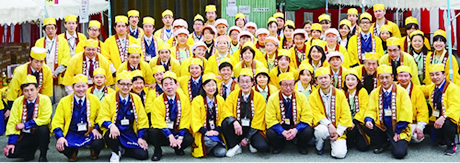
Company members
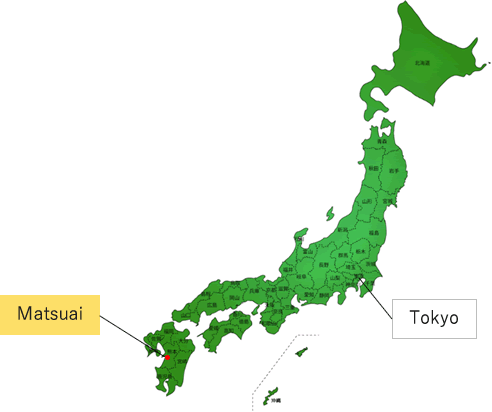

Forth president of
our company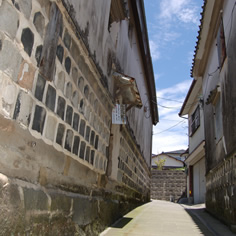
Warehouse from
the Edo period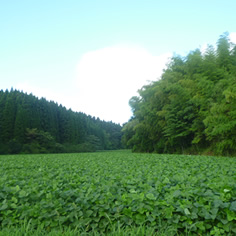
Soybean field
Premium products
Miso Takumi No Waza 500g
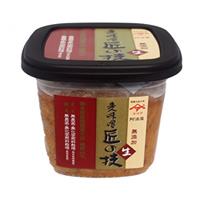
No-Pesticide Additive-free
Miso Takumi No Waza is made from soybeans, naked barley and sun-dried salt. Soybeans and naked barley are grown in Kumamoto without using pesticides.
This fully aged barley miso has a unique flavor of barley that stimulates your appetite.
Naturally Brewed Marudaizu Soy Sauce 900ml

No-Pesticide Additive-free
Naturally brewed soy sauce made from whole soybeans and wheat grown without pesticides or chemical fertilizers during the cultivation period in Kumamoto and mineral-rich sun-dried salt. Through a slow fermentation and maturing process of one year or more, it maximizes a rich aroma and a full-bodied flavor.
Popular products overseas
Authentically Brewed Soy Sauce “SAKURA” 1.8L

Additive-free
It is an authentically brewed soy sauce in which sugar is added to make it mildly sweet. It pairs well with sushi, sashimi, and other dishes, and can also be used in cooking.
It was awarded for the top-prize of “the Ministry of Agriculture, Forestry,and Fisheries “ in the National Soy Sauce Competition.
Yuzu Ponzu 900ml

Our Yuzu Ponzu is made with natural yuzu juice from the Shimanto River basin, this ponzu offers a perfect harmony of soy sauce, vinegar, and citrus.
It was featured in the magazine called “Casa BRUTUS”, as one of the three best ponzu.

i-syoku-dou-gen
for generations in Japan and China.
“i” = curing, “shoku” = eating, “dou” = same, “gen” = origin.
It simply means that both factors, eating and curing,
relevant to each other and are ways to maintain healthy life.
Food is the essential part of maintaining health,
therefore it is important to select what we eat.
In this article, we would like to introduce the
traditional Japanese food: miso, soy sauce,
and vinegar which have supported the health and food culture.
About Fermented Food
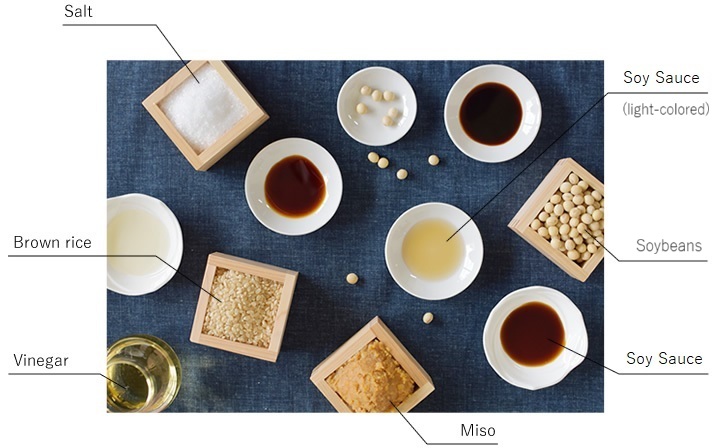
Among the processes of microorganisms’ metabolizing and producing organic matter, what is beneficial to humans is called fermentation, apart from rotting. For example, bread, cheese, yogurt and alcoholic drinks are made with fermentation process and are produced all over the world. In Japan, fermentation is used to make miso, soy sauce, vinegar etc., which are essential to traditional Japanese cuisine.
Miso
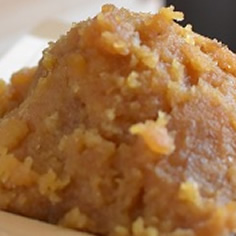 miso
miso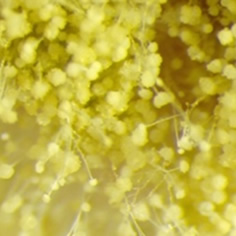 koji-mold
koji-mold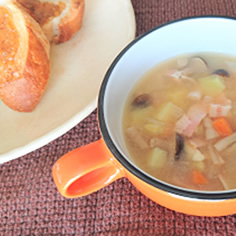 miso soup
miso soup
For miso, the record of original form was found in the 8th century, and by the 17th century, it was produced on an industrial scale. Ingredients of miso are soybeans, salt, rice and barley and are fermented with koji-mold (aspergillus oryzae). Fermentation and maturing periods differ depending on each product. Generally, it takes 1 month to 1 year, but some types of miso take even longer. Like wine or whisky, people enjoy the variation of flavor and color made by the length of fermentation period.
Miso is mainly used to make miso soup, the most typical Japanese home dish. It is also used for salad dressing, meat dishes, stewed dishes, and even for sweets. Miso has many health benefits. Some research reports say that “Melanoidin,” the antioxidant action of brown pigment, which is generated when miso ages, helps to prevent life-style related diseases, cancer, and to suppress the effects of radiation. Koji-mold, yeast and lactic acid bacteria used in the process of making miso are also effective for improving our intestinal condition. It is said that when the intestinal environment improves, the immune function enhances. In order to get its full effect, it is important to have raw miso and keep it to 60 degrees or less when heating.
Miso, the healthy and powerful food, can be used not only for traditional Japanese cuisine, but also for cuisines and confectioneries around the world. We would like people in the world to use this wonderful condiment.
Soy Sauce
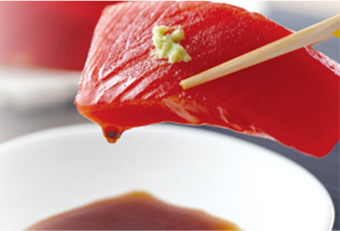
Soy sauce is essential for Japanese cuisine. It has a long history, in fact, there are records of its existence from the 16th century.
Soy sauce is made in several steps; add koji-mold to soybeans and wheat, add salt, let it ferment and age, then press to make its liquid form. The black color component of soy sauce is called “melanoidin,” and its antioxidant effect helps remove fish and meat odors, has antibacterial effect, contributes to preservation, and enhances the taste of food.
In addition, it is said that its scent contains 300 kinds of fragrance components such as flowers, fruits, coffee and sake. Soy sauce matches with a variety of savory dishes and desserts. The fragrance and flavor of soy sauce are key elements in how dishes taste, and it is used in many sauces for various dishes. It is often called an all-purpose seasoning.
Vinegar
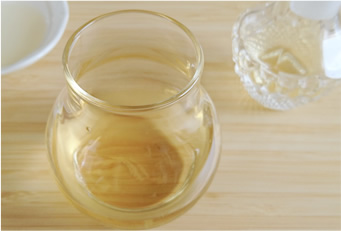
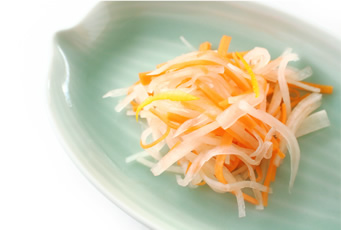
Japanese vinegar is mainly made from rice and is widely used for seasonings, drinks, and preserved meals.
The health benefits of vinegar have been suggested for many years. It has been reported that vinegar helps moderate the rise in blood sugar levels after meals, lower high blood pressure, and reduce visceral fat.
It also helps relieve temporary daily fatigue and can stimulate appetite. When used as a seasoning in cooking, it can help reduce salt intake, making it a great addition to your daily routine.
(Source: Japan Vinegar Institute Head Quarter / 全国食酢校正取引協議会, A Simple Guidebook to Vinegar, accessed May 23, 2025, http://www.shokusu.org)
“Take about one tablespoon (15 ml) of vinegar per day to get the health benefits.”
Regular daily intake is recommended. You can enjoy it in pickles or dressings, and adding it to simmered or stir-fried dishes is also a great option. When heated, its sharp aroma fades, making it easier to enjoy even for those who are not fond of its strong scent.
Miso, soy sauce and vinegar all serve beneficial effects on our bodies, so it is good to have them every day in our diet.
MATSUAI FOOD CO., LTD.
URL https://www.matsuai.co.jp/
Address: 188 Matsuai Shiranuhi-machi Uki-shi Kumamoto JAPAN
TEL: +81 96 442-2212
Contact person: Kazuhiro Uemura E-mail: matsuai-yamaa@matsuai.co.jp




